Sound Advice with Mattie B, Taking ownership of your tone... tO(w)nership!
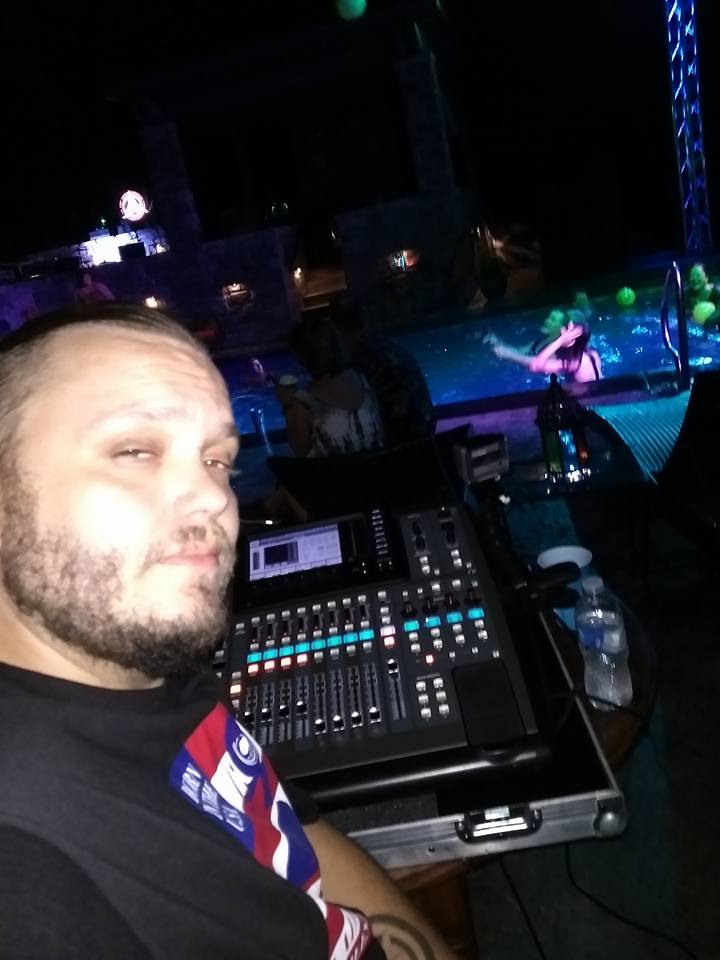
strap in folks, this is a long one.
I've been doing this a long time.
Over fifteen years of Live Sound Engineering now, and at least ten of Studio Sound Engineering. Would you believe I've had over a thousand bands under my fingers at this point? Believe it! That's a super conservative estimate of me working with or running a hundred bands a year for each of those years. The truth is, maybe my first couple years in that number would have been accurate, but once I got established, that number likely jumps to triple that... So, with my horn tooting complete, its time to get to the point...
I've ran over a thousand bands...
I've seen successful bands, and not so successful bands. I've ran bands that are just magical. That would set your soul ablaze, that make you feel so privileged to be working with them that you would eat your own hat just to be able to run another show for them. You know what EVERY. SINGLE. ONE. of those bands has in common?
tO(w)nership
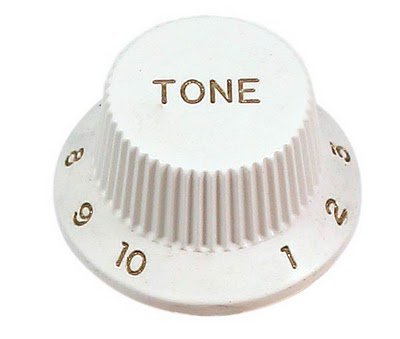
You like that? I made it up, but seriously; every one of those bands takes ownership of their tone. They craft it, they cajole it, they are as exacting as true craftsmen/women should be. They set a standard, and they demand that they meet it.
Listen,
I shouldn't have to stop soundcheck to come fix your amp. And mostly, I wont. Unless I like you. But even then, Its really your job innit? But if you haven't taken the time to do it yourself, it likely won't ever get done. And that means you're always going to sound awful.

Don't get it twisted...
You may have great songs, and incredible chops. But if you went and bought an amp from the amp store, and brought it home and plugged it in, thinking that's it... Job Done! Then read on, cause you need this:
There are three main areas of concern that you as a band HAVE to ADDRESS before you play your next gig.
- Instrument tone
- Amplifier Tone
- and Pedal Tone (if you use pedals)
Disclaimer This piece isn't going to tell you how to address all of those things, it's important that you as a professional musician know how to get the best tone out of your instrument. But This piece IS going to drive home the importance of really dialing the best possible tone you can for your particular instrument, and maybe point you in the right direction. Also, bear in mind that this isn't just for guitarists. Some of the worst tone offenders are in fact...
Drummers!
That's right! Do you realize that most small venues you play aren't really putting you in the mix drummers? They are usually mixing the rest of the band to match your acoustic volume. They may run the kick through the system to get some punch, and if you're really lucky, they'll put your snare in the system. If they have "mic'd" the rest of your rig, odds are really good that's just for effect, if you look at their board, everything but kick and maybe some snare are zeroed out. There is a reason for this.
Your drums are FUCKING LOUD!
Seriously, a comfortable volume for a small venue is around 90db. That's the sweet spot. That means the band is dominating the acoustic landscape, but not so much that the bartenders can't hear what their paying customers order. Most venues will insist that sound guys stay in this area, unless its a big name act that people have come to see. And I got bad news for you Jack, your drums exceed that. Just acoustic, they are probably in the 95db range, if you are a medium to heavy player (and some players bash the hell out of them, getting way up there into the hundreds...) You aren't likely to be asked back to that venue if that's the case... But this isn't an article about volume control, but it is a connected topic.
The point? I am mixing the entire rest of the band to match you, and its still likely that you are going to be one of the loudest members of the band. That means if your tone sucks... EVERYBODY HEARS IT They may not recognize they are hearing the product of bad tone, but I promise you they won't like it. So drummers, mind your fucking tone and learn to tune your goddamn drums. Start by doing this:
- Open the google machine
- type "drum tuning tutorial"
- click the most credible looking link
- follow the instructions
Seriously guys. You HAVE TO DO AT LEAST THIS! Your drums ain't going to tune themselves, and that big break ain't never going to happen, unless you handle your shit. Venue owners notice. Sound guys DEFINITELY notice, and that talent scout you're praying for, he is damn sure going to notice. But more important, your fans will notice, and they deserve better. You've blasted them for weeks about coming to the show on FB. You've harassed them into buying your presale tickets... They get there and you don't even have the courtesy to tune your gear? Good luck selling those same folks tickets again. It's an excellent way to destroy your fan-base, and ensure you play nowhere, and for nothing all the time.
Guitarists
Just because I went after drums first doesn't mean you get out of this without a scratch. In fact, I really wrote this whole damn thing for you.
First
Tune your instrument, of course. But just as important is your setup. If you have to stop and tune twenty times throughout the set, you gotta go see your tech. Get your intonation fixed up, and it will save you a ton of grief. This will cost you thirty to fifty bucks, but OMG, you will thank me for it. While you're there, talk to your tech about what sort of tone you are going for. Tell him things like;
- do you want your tone to be bottom or top heavy (crunchy or screaming) and he may adjust your pickup height accordingly
- do you like high or low action, If you prefer low action (who doesnt?) he may adjust your neck relief to make sure your strings arent fretting out and killing your tone...
Plus, he is probably a freaking tone master, and should be the first person you ask about what sort of pedals and amps you need to get the tone you're after.
Next
Take your amp selection very seriously.
I get that budget is an issue, so shop in your price range. Here, are you ready? I'm about to lay the biggest secret in the industry on you. Its going to change your life forever. Lean In Close...
YOU DO NOT NEED A FUCKING FULL STACK!
Or even a half stack! Seriously, I swear to fucking god, when a guitarist shows up with way more goddamn amp than they need, we all know its going to be a shitty night.
You might need thirty watts, maybe forty tops. I promise you, that is plenty for me to mic, and get great volume out of.
Look for an amp of that size with a decent set of tubes. Here is some more golden advice, look for an amp with a power dump feature. Your tubes will really sound their best when you can drive the hell out of them, but often that means pushing your volume waaay up there. With a variable wattage, or power dump, you can dial down your power amp, while pushing the hell out of your pre amp, pushing those tubes to the max, while maintaining a reasonable volume.
Here are a couple great options that won't break the bank:
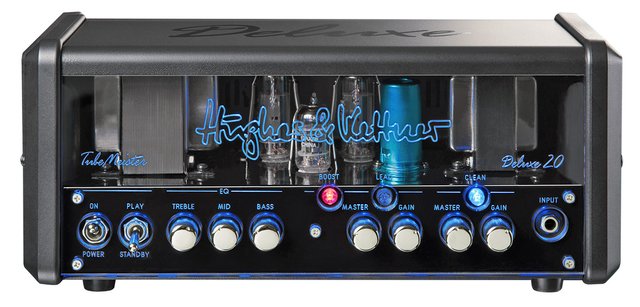
But more importantly than buying a great amp, is learning to get the most out of what you got.
Again, you can hit the google machine. There are literally millions of articles out there describing how to dial your amps. My advice: Play with it. Set your Master volume to a comfortable listening level, and then run your gain knob up and down, exploring the driven tones you can control. And then do the same thing with each and every eq pot, and the same with every effects pot. Just get in there, and play. Find a great clean tone, and a great driven tone, and make those your cornerstones off of which the rest of your tone is based.
Here is a bit of real sound advice, from a real sound guy:
Guitars are a mid-range instrument. They will fit best into the mid-range of the mix. Less is more. Don't occupy space that belongs to your rhythm section by putting a ton of low end into your tone, and stay out of the really high high area, it gets harsh and unpleasant. When I'm mixing guitars, I ALWAYS cut pretty much everything below 400Hz, and above 5kHz. One other thing to keep in mind, your vocalist is also working with a mid-range instrument. If your vocalist sings low mid, then you are going to have to be a high mid guitarist. The reverse is also true. Wherever your vocalist is most comfortable, you are going to have to occupy a space adjacent to that, or one or both of you will be unintelligible. Take that into consideration when setting your cornerstone tones.
Now, onto
Pedals
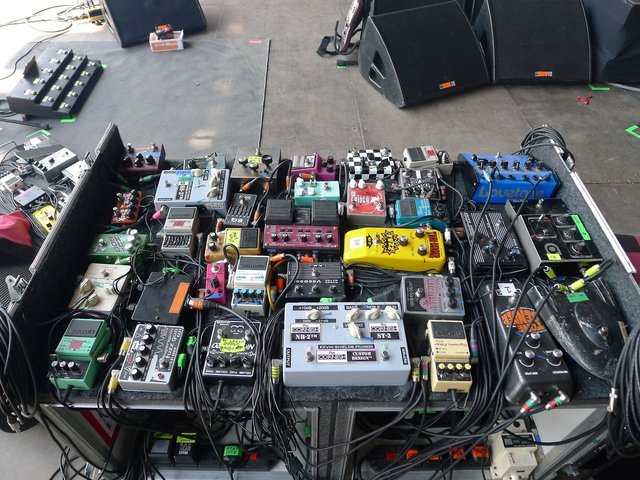
I really can't even get into that, unless I want this post to be a mile and a half long... But I want you to try an experiment. If you have a huge pedal board, play your next couple practices without it. Just get your AB switch that jumps you from clean to driven on your amp and use it for practice. If it does not sound good, dial those tones. Pedals are for tone augmentation not tone creation. If you are relying on your pedals to create your tone, you are going to have a really shitty time if your pedal decides to shit the bed one night before a gig. Your tone should come from your amp, and be accented by your pedals. If you can't play a show pedal free, you maybe shouldn't be playing shows... unless you are a one man band using loopers and shit.
Your preferred music shop is another great resource. They are probably having clinics, and such all the time. Go to a couple, it seriously can't hurt, even if its a completely different style than what you are playing.
In conclusion:
Your tone is an auditory representation of your craft.
Take your craft seriously, and other people will take it seriously too.
I have recently started a project to create a Steemit Funded Mobile Studio and have set myself a goal of saving half of my authorship rewards on non-related posts, and all of the rewards on post directly related to the project until I can afford to get phase 1 off of the ground. I'm pleased to report that my savings account has grown to 19.5 Steem!. It's slow going right now, but when I will get there. So anyways, give this post some love, and half will go to that. Go give that post some love, or any of the subsequent updates...
Bona Fides
I have an AAS Degree in Electronic Media Production
I have been a professional live and studio engineer for fifteen years in the southern Missouri area.
I was a production manager for Music City Center in Branson, where I singlehandedly ran sound, lights, video and lasers for the Trans Siberian Experience on a system a designed and implemented.
I was Stage Manager for Scott Shipley Music (one of Johnny Cash's guitarist) and ran over a hundred dates.
I Ran the Pro Audio Dept at G.C. for eight years, selling and servicing systems of all sizes
I am currently the Resident Engineer at The Old Glass Place in Springfield MO., And the on call engineer at Lindbergs Tavern in Springfield
I am also currently the lead system designer for an AVL systems integrator here in Springfield.
finally, I'm a father of four... So I know how to deal with noise...
Ask Me About becoming a member of the Steemit Local Music Society!


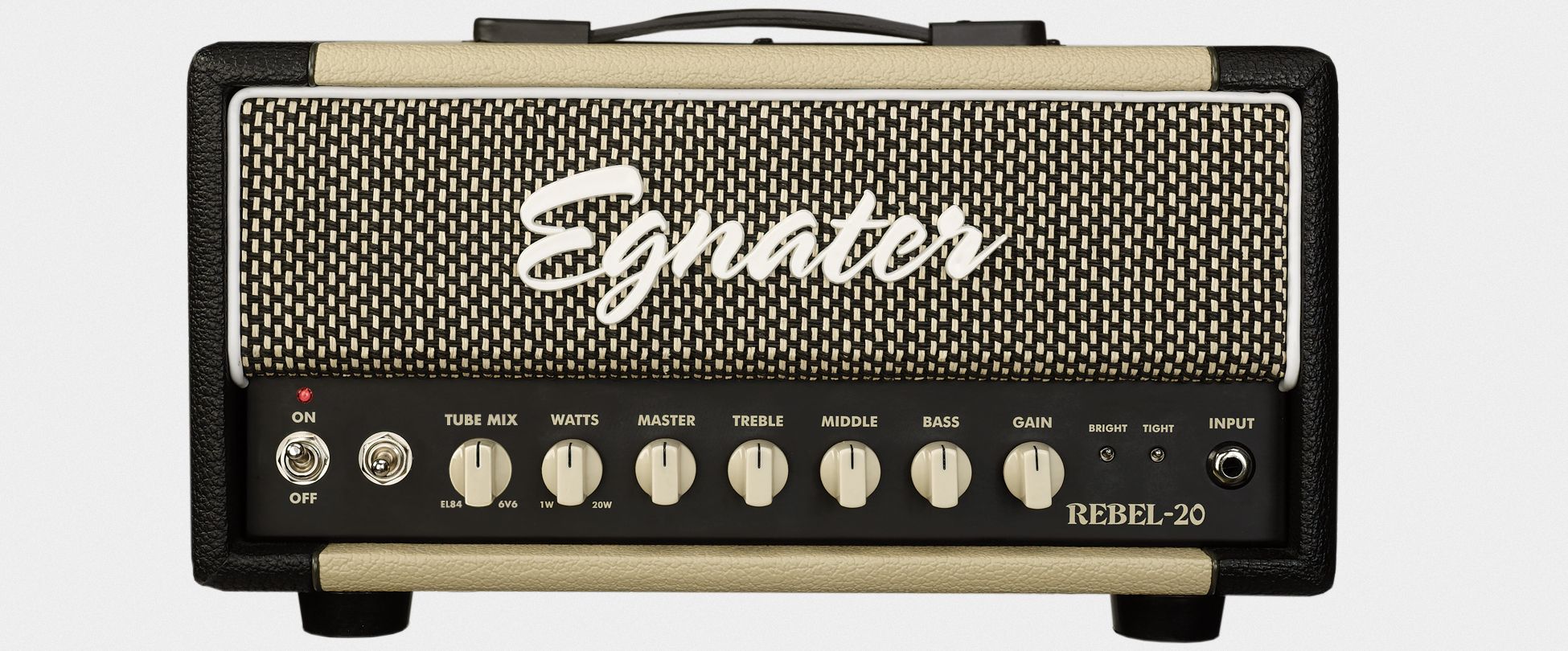
Gotta have dat sound man. :)
Great article. I am going to tip you some monies toward your mobile studio project when my next payout comes in. :)
*hugs! Thank you. You know it means a lot to me, coming from you!
...also, of course! Would love to see this dream become a reality through Steemit.
Steemwork Makes the Dream Work
Make sure this gets into promo rooms on the Discord server. Perfect for the production as well as the music-related articles rooms. :)
Congratulations! This post has been upvoted from the communal account, @minnowsupport, by Mattie.B-Leaver from the Minnow Support Project. It's a witness project run by aggroed, ausbitbank, teamsteem, theprophet0, and someguy123. The goal is to help Steemit grow by supporting Minnows and creating a social network. Please find us in the Peace, Abundance, and Liberty Network (PALnet) Discord Channel. It's a completely public and open space to all members of the Steemit community who voluntarily choose to be there.
If you like what we're doing please upvote this comment so we can continue to build the community account that's supporting all members.
Excellent article, thank you so much for taking the time to get it down. I like how you pulled no punches! I humbly salut you :)
Thank you! I pull punches at the gig, because I want the talent to feel at ease. The last thing they need there is to be sweating over all the shit their sound guy is giving them. Ultimately my job is to make them sound as awesome as possible. There is more to that than just turning knobs. You gotta get them into the right headspace. So, I go easy on them come gig night, but these are things they need to hear at some point. Thanks for the comment!
Sounds like you're a great man to have as a sound guy. I'm happy you get to do what you love for a living!